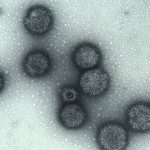Lien vers HAL – sorbonne-universite-03135459
Lien DOI – 10.1186/s13027-021-00351-w
Infectious Agents and Cancer, 2021, 16 (1), ⟨10.1186/s13027-021-00351-w⟩
Mucosa-associated lymphoid tissue (MALT) lymphoma is generally associated with chronic antigen stimulation:auto-antigens or of microbial origin. Only one study suggested association betweenAchromobacter xylosoxidansand pulmonary MALT lymphoma. We aimed to investigate the presence of virus or any infectious agents inpulmonary MALT lymphoma by using metagenomic next-generation sequencing (mNGS).All lung samples were centrally reviewed. The t(11;18) (q21;q21) was evaluated by FISH analysis. The snap frozenlarge lung biopsies were analyzed by mNGS. After lung biopsies homogenization total nucleic acids (RNA and DNA)were extracted, amplified and classified according to their taxonomic assignment, after exclusion of host DNA.We included 13 samples from pulmonary MALT lymphoma (mean age: 60.3 years, 7 women, 3 with auto-immunebackground) and 10 controls. The diagnosis of MALT lymphoma was confirmed for the 13 samples, 3 showed API2-MALT1 translocation (23%). No evidence of the presence of a specific pathogen was clearly identified in the groupof patients with pulmonary MALT lymphoma. We identifiedA. xylosoxidanssequence in 4/13 patients and in 4/10controls.This study did not find evidence for a DNA or RNA virus, a fungi, a parasite or a bacteria associated with pulmonaryMALT lymphoma either in the stroma or in tumor cells.

